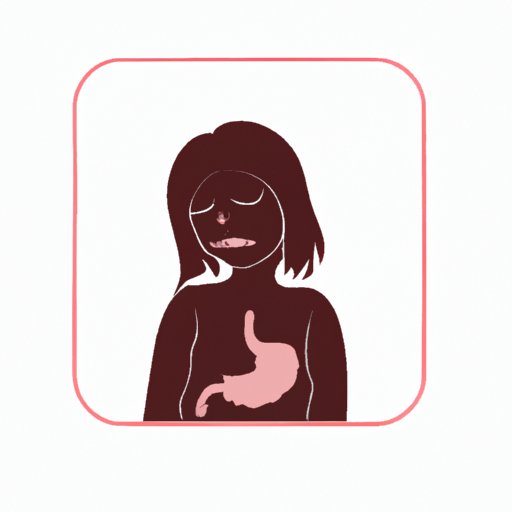Introduction
Being pregnant comes with a lot of questions and concerns, especially for first-time mothers. One question that often arises is whether it is possible to be on your period and still be pregnant. This issue can be confusing, and it is important to have a clear understanding of the facts to put your mind at ease.
Debunking the Myth: Can You Really Be on Your Period and Be Pregnant?
Many people believe that having a period while pregnant is common and that it is possible to continue to have regular periods throughout pregnancy. However, this is a common misconception. It is not possible to have a true period while pregnant, and any vaginal bleeding experienced during pregnancy is not menstruation.
Understanding Menstrual Cycles and Pregnancy: Can They Overlap?
To understand why it is not possible to have a true period while pregnant, it is important to understand how the menstrual cycle works. The menstrual cycle is the process by which a woman’s body prepares for pregnancy through ovulation. During this time, the uterus builds up a lining that is shed if fertilization does not occur, resulting in what we call a period.
During pregnancy, however, the uterus maintains a thick, nutrient-rich lining to protect and nourish the growing embryo. This means that a woman’s body does not go through the same process of building up and then shedding the uterine lining as it does during menstruation.
While it is unlikely, there is a rare possibility that ovulation can occur twice in a menstrual cycle, and a woman can become pregnant after having a period. In this case, it may appear as though the woman is having a period while pregnant. However, it is important to note that this is not the same as having a true period while pregnant.
Spotting vs. Period: How to Tell the Difference During Early Pregnancy
Spotting is a common occurrence during early pregnancy, and many women confuse it with having a period. Spotting is light bleeding that occurs when the fertilized egg implants itself in the lining of the uterus. This typically happens around six to ten days after conception, and it can be mistaken for a light period.
The main difference between spotting and a period is the amount and duration of bleeding. A period typically lasts between three and seven days and involves moderate to heavy bleeding, while spotting is lighter and may only occur for a day or two. Additionally, spotting is usually pink or brown, while period blood is typically bright red.
One way to determine if bleeding is spotting or a period is to track your menstrual cycle and note any differences in the timing and duration of bleeding. If bleeding occurs outside of your usual period, it is more likely to be spotting.
The Science of Menstruation and Conception: What Every Woman Should Know
When a woman becomes pregnant, fertilization occurs when a sperm cell penetrates an egg in the fallopian tube. The fertilized egg then travels down the fallopian tube and implants itself in the lining of the uterus, where it begins to grow into an embryo.
During this process, hormonal changes occur that can impact the menstrual cycle. For example, the hormone progesterone, which is essential to maintaining a pregnancy, can cause changes in cervical mucus and vaginal discharge. These changes can make it difficult to determine whether you are experiencing spotting or a period.
When Two Worlds Collide: The Rare Phenomenon of Menstruating While Pregnant
While it is not common, it is possible to experience bleeding during pregnancy that resembles a period. This can occur for a variety of reasons, such as irritation of the cervix during intercourse or a cervical polyp. In some cases, bleeding can be a sign of a more serious issue, such as a miscarriage or ectopic pregnancy.
If you experience any bleeding during pregnancy, it is important to seek medical advice. Your doctor will be able to determine the cause of the bleeding and whether it is a cause for concern. It is always better to err on the side of caution and seek medical attention if you are unsure.
Misconceptions About Pregnancy: The Truth About Having a Period While Pregnant
There are many misconceptions about pregnancy and menstruation, and it is important to separate fact from fiction. It is not possible to have a true period while pregnant, and any vaginal bleeding during pregnancy should be evaluated by a medical professional.
Another common myth is that bleeding during pregnancy is always a sign of a problem. While it is true that bleeding can be a sign of a miscarriage or other issue, spotting during early pregnancy is common and usually not a cause for concern. However, if you are experiencing bleeding, it is important to seek medical advice to determine the cause and ensure the health of you and your baby.
Conclusion
While it may be confusing and even alarming to experience bleeding during pregnancy, it is important to remember that it is not possible to have a true period while pregnant. If you are concerned about bleeding during pregnancy, it is important to seek medical advice to determine the cause and ensure the health of you and your baby.
Remember to track your menstrual cycle and note any changes in bleeding so that you can better determine if you are experiencing spotting or a period. And above all, listen to your body and seek medical attention if you are unsure or concerned about any changes.
